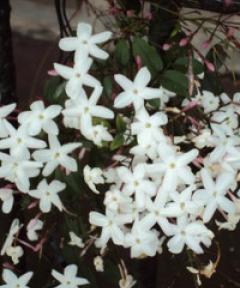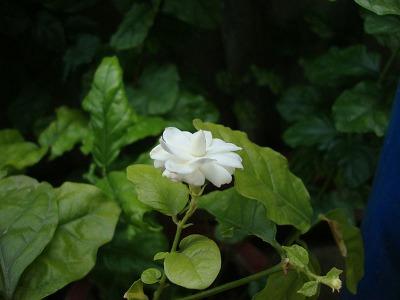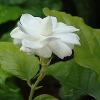Following on from my previous post on the aromachology of rose the spotlight will now be focused on the enticingly fragrant jasmine flower.
Jasmine is an evergreen, climbing shrub with dark green leaves and fragrant star shaped white or yellow flowers. There are a great many species of jasmine, in aromatherapy and perfumery the cultivars used include Jasminum grandiflorum, J.sambac and J.auriculatum.

The aroma of jasmine can be described as a warm, heavy, opulent floral with fruity and animalic facets,well deserving of its title ” King of the Flowers “. The flower’s sensual and intoxicating aroma has a long tradition as an aphrodisiac, in Sufi poetry it is known as a symbol of love and spiritual longing.
The rich, sweet aroma of jasmine flowers, in particular Jasmine sambac becomes more intense at night leading to its moniker of “Queen of the Night” or ” Moonlight of the Grove “.Not surprisingly jasmine has associations with the moon or moon goddess in many mythologies.
Looking at jasmine from an aromachological perspective, that is, the effect of fragrance on behaviour, psychology or mood , its aroma has many different applications.
Effects on mood
Jasmine has mood lifting qualities, like rose it can elicit positive memories and is a morning mood enhancer.

In aromatherapy practice the essential oil is used to lessen anxiety and stress and to improve mood. From a Traditional Chinese Medicine perspective jasmine is said to harmonise Heat and Fire elements, supporting and relaxing Qi energy of the heart thus calming and releasing tension.(Mojay 1997)
Exposure to its aroma has been shown to have stimulating and antidepressant effects. (Yagu 1994)The aromatherapist Susanne Fischer-Rizzi aptly describes it as ” no other oil is quite as capable of changing our mood so intensely, it offers little choice other than optimism. ”
On a personal note the smell of jasmine signifies feelings of hope and optimism, a heady scent memory heralding the beginning of Spring when the first blooms of jasmine make their appearance.
Effects on concentration, cognition and motivation
The fragrance of jasmine can trigger beta waves in the frontal region of the brain, stimulating alertness. Beta waves have a role in memory, focus and attention and when we are involved in critical thinking or thinking logically.
In a testing room environment jasmine enhanced problem solving and cognitive skills leading to more interest and motivation from the participants.(Rottman,T.R 1989)
The Japanese fragrance company Takasago (now incorporated with Avon)conducted an experiment where different fragrances were intermittently released into the workplace, the scent of jasmine resulted in a 33% decrease in the amount of keyboard errors when it was used.(Whiff:The revolution of scent communication in the Information Age, C. Russell Brumfield p.50)
Research by Hirsch et al in 2007 revealed that jasmine can improve bowling scores in a study where ten pin bowlers wore surgical masks scented with jasmine.It was suggested that this is due to an effect by jasmine on regulating mood, lessening anxiety, increasing alertness and improving self confidence and focus. A similar effect could be expected in other activities involving detailed hand-eye coordination and precision.
These results were mirrored in another study by Dr Alan Hirsch in a group of baseball players using scented wristbands where the jasmine smell showed an improvement across all batting parameters.
Jasmine odour is also associated with improving physiology recovery time, showing a markedly faster return to pre-exercise physiological baseline levels when athletes completed a treadmill stress test (Smith and Raudenbush 2004).

Effects on sleep
On the flip side which can be seen as an extension of its anti anxiety effects, jasmine has sleep enhancing effects.
In testing comparing jasmine, lavender or no scent on people sleeping, jasmine had an effect of improving the quality of sleep- participants slept more peacefully with less sleep movement and were more alert in the afternoon compared to those exposed to lavender or no scent.
On waking people were given questionnaires and tests and reported they felt less anxious and performed the tests more rapidly compared to the other groups, which reflects the results achieved in the other studies previously mentioned, (Raudenbush et al 2003)
Effects on cravings
Another interesting effect of jasmine aroma has been shown in an Australian study at Flinders University, SA. Jasmine greatly minimised chocolate cravings compared to groups exposed to the smell of green apple or water (control).
Jasmine has a very opulent and full bodied sweet aroma, perhaps by extension of this it can potentially dampen cravings for something rich and sweet like chocolate.

To make a jasmine scented cream or massage oil- to 100mls of cream base or massage oil base add and mix jasmine 3% in jojoba essential oil – 1 ml (20 drops) for a face cream, 2.5 mls (50 drops) for a body cream or massage oil.
Place a few drops of jasmine essential oil on a tissue or makeup sponge and leave on your desk or workplace to sniff periodically.
Try some jasmine tea to de stress or as a sleep aid. The Jasmine sambac flower is used in these teas. Jasmine tea odour has been found to have calming, sedative like effects.
Place some freshly picked jasmine flowers in a bowl of water as a fragrant table centrepiece.
For some gastronomical aromachology a few links to jasmine scented recipes and products:
- Spring salad with jasmine flower vinaigrette. Taste.
- Rice in jasmine scented ice water- Khao Chae. She Simmers.
- Jasmine ice cream - Bastani-ye Goleh Yas. My Persian Kitchen.
- Jasmine sour martini. Food Republic.
- Organic jasmine liqueur. Koval.
- Jasmine scented chocolates. Maison Bouche. (Jasmine may serve a dual purpose here- for fragrance and inhibitor of over consumption!)
Further links:
- Grasse jasmine festival.
- The Guardian. A Summer festival held in Grasse every year on the French Riviera to celebrate the jasmine flower.
- Profile on jasmine as a raw material in perfumery. Fragrantica.
- Cultivation practices of bush jasmine. Kissankerala via Youtube. Unfortunately no English subtitles but some lovely images of jasmine and its cultivation in India.






